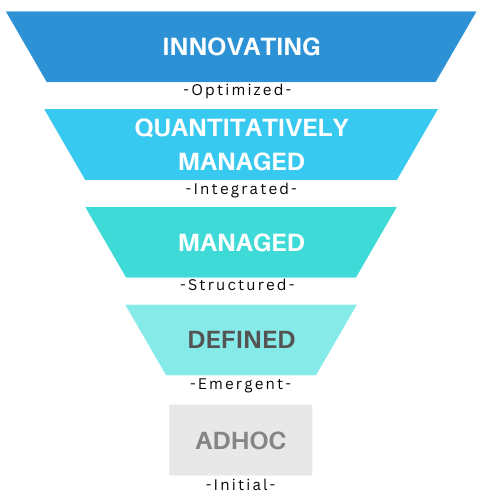Enterprise Agile Transformation
Introduction
Agile Transformation empowers large enterprises to evolve from rigid, traditional frameworks to dynamic, adaptable systems. In an ever-changing business ecosystem, this shift is pivotal for enterprises seeking swift response to market demands, fostering innovation, and ensuring sustainable growth

Significance


Evolutionary path of an Enterprise towards Agile Adoption
The stages of Agility typically represent the evolutionary path an organization takes as it becomes more proficient and holistic in its Agile adoption. While there isn’t a one-size-fits-all model, many frameworks and experts have proposed various stages. Here’s a common representation:

Initial (Ad-hoc)
At this stage, Agile practices are unpredictable, poorly controlled, and reactive. Teams might be trying some Agile practices, but there's no consistent approach or shared understanding.

Emergent (Defined)
The organization starts to see the benefits of Agile and starts formalizing Agile processes. There's a foundational understanding, but it might be limited to specific teams or projects

Structured (Managed)
Agile practices are now documented and integrated into standard procedures. The organization starts scaling Agile across multiple teams, but it may not be enterprise-wide yet

Integrated (Quantitatively Managed)
The organization has a holistic view of Agile, with cross-functional collaboration and an integrated approach to delivery. Metrics and KPIs are used to measure and improve performance.

Optimized (Innovating)
The organization is continuously improving and innovating its Agile practices. Agile mindset is deeply embedded in the culture, and the organization is adaptive, resilient, and customer-centric.
Journey Towards Success
WHAT IS AGILE
Key Areas We Focus As A Part Of Our Agile Transformation
Customer-Centricity
Transforming into an Agile organization means fostering a culture of collaboration, transparency, and trust. Hierarchical silos are broken down in favor of cross-functional teams that collaborate to achieve common goals.
The Impact we Create
Why Agile Transformation Is Relevant For
Dynamic Market Conditions
Rapid Technological Advancements:
As technology evolves at a breakneck pace, businesses need to adapt quickly to stay relevant. From AI to blockchain, new technologies are reshaping industries.
Changing Consumer Behavior:
With access to instant information and a plethora of choices, today’s consumers are more informed and discerning. Their preferences and loyalties shift faster than ever before.
Globalized Competition
In today’s interconnected world, enterprises are not just competing with local businesses but with global entities. To stay ahead, businesses must be swift in decision-making, innovation, and execution.
Demand For Customization
Shorter Product Lifecycles
Products become obsolete faster in many industries. This mandates businesses to reduce time-to-market and iterate on their offerings continually.
Complexity in Operations and Delivery
With the proliferation of digital channels, global supply chains, and diverse stakeholder groups, managing and delivering projects have become more intricate. Agile methodologies help in breaking down this complexity, ensuring more manageable and transparent workflows.
Emphasis on Collaboration and Openness
The modern workforce, especially the younger generation, values transparency, collaboration, and a sense of purpose. Agile environments, with their emphasis on teamwork and open communication, resonate with these values, aiding in talent attraction and retention.
Evolving Work Environments
Remote work, flexible hours, and distributed teams have become the norm, especially post the COVID-19 pandemic. Agile practices, with their decentralized decision-making and emphasis on outcomes over hours, align well with these new work paradigms.
Risk Management
Given uncertainties like global economic downturns, pandemics, or industry disruptions, businesses need a framework that allows them to adapt quickly. Agile practices, with their iterative nature, enable organizations to pivot as needed, managing risks more effectively.
Continuous Learning and Improvement
To ensure long-term sustainability and growth, enterprises must be in a perpetual state of learning and enhancement. Agile methodologies, with their feedback loops and retrospectives, instill a culture of continuous improvement.
Our Approach To
Assessment
The ‘Assessment’ phase stands paramount, serving as the foundational bedrock, guiding our strategic approach and shedding light on the areas demanding immediate focus to ensure a holistic and effective transformation journey
Custom Strategy Development
Implementation And Coaching
Organizations are continuously challenged to adapt and innovate. Agile transformation has emerged as a strategically designed methodology allowing organizations to swiftly adjust to changes while fostering flexibility and resilience. By focusing on continuous improvement, organizations can regularly review and adapt their agile practices, ensuring they are always at the forefront of project management best practices. The journey towards agile transformation isn’t just about adopting a new set of tools or practices; it’s about reshaping the very fabric of an organization. It requires addressing inherent siloed structures, promoting collaboration, and integrating principles that prioritize iterative and incremental development. This alignment with agile principles not only paves the way for enhanced collaboration and self-organizing cross-functional teams but also guides organizations in cutting out wasteful practices, further optimizing costs and efficiency. With this foundation, the following bullet points delve deeper into the specifics of our agile transformation approach.
Continuous Support
Our approach goes beyond the initial implementation of Agile methodologies. Recognizing that the true value of Agile transformation lies in its sustained practice, we offer Continuous Support. Post-implementation, it’s vital for organizations to maintain the momentum and ensure that the Agile practices integrated are not just short-lived initiatives but become deeply ingrained in the company’s work culture. To achieve this, we provide ongoing assistance tailored to your needs. This includes regular check-ins, training refreshers, addressing challenges that teams might face, and refining practices based on continuous feedback. Our teams remain dedicated to ensuring that your organization reaps the long-term benefits of Agile, fostering a culture of continuous improvement and adaptability. The objective is to empower businesses not only to adapt but to thrive in a dynamic environment, leveraging the full spectrum of Agile benefits
Enterprise Agile Best Suited For
Software Development
Financial Services
Healthcare
Manufacturing
Marketing and Media
Retail
Education
Telecommunications
Government and Public Services
Real Estate and Construction
Our Capabilities
Enterprise Agile transformation is not just limited to small-scale projects or singular teams; it’s expansive and versatile in its implementation. Here’s an emphasis on its broader capabilities:
Benefits Of Agile Transformation For
Agile transformation is more than just a change in processes; it’s a shift in organizational culture and mindset. By adopting Agile practices, enterprises position themselves to be more adaptable, efficient, and customer-centric. Here are some compelling benefits that enterprises stand to gain from Agile transformation:
Common Hurdles
Typical Challenges Faced By Enterprises During Transformation.
Transitioning to Agile practices at an enterprise level is a commendable move. However, it often comes with its own set of challenges. Recognizing and understanding these challenges is the first step towards effectively navigating them. Here are the typical challenges faced by enterprises during Agile transformation:
Resistance To Change
Employees, especially those accustomed to traditional project management methodologies, might resist the shift to Agile, viewing it as an unnecessary upheaval
Inadequate Training
Without proper training and understanding of Agile principles, teams might face difficulties in adopting new practices.Lorem ipsum dolor sit amet, consectetur adipiscing elit. Ut elit tellus, luctus nec ullamcorper mattis, pulvinar dapibus leo.
Scaling Challenges
Implementing Agile in small teams is different from scaling it at the enterprise level. Organizations might grapple with maintaining consistency across different teams.
Misalignment Of Goals
Different departments or teams might have varying objectives, leading to a lack of cohesion in Agile adoption
Inconsistent Commitment
Agile requires a consistent commitment from all stakeholders. Fluctuating commitment levels can disrupt the transformation process.
Cultural Barriers
Agile promotes a culture of collaboration, transparency, and feedback. Enterprises with a hierarchical culture might find this shift challenging.
Overemphasis On Tools
While tools are essential for Agile practices, over-relying on them without understanding the underlying principles can be counterproductive.
Lack Of Stakeholder Buy-In
For Agile transformation to be successful, it’s crucial to have the support of all stakeholders, including top management.
Ineffective Communication
Agile relies heavily on communication. Ineffective communication can lead to misunderstandings and hinder progress.
Setting Unrealistic Expectations
Enterprises sometimes expect immediate results post Agile adoption. It’s essential to understand that Agile transformation is a journey and not a destination
How We Navigate Them
Our Proven Solutions
To navigate these challenges, it’s essential to have a clear vision, provide adequate training, ensure continuous feedback, and promote a culture of openness. Engaging Agile coaches or consultants, fostering a learning environment, and focusing on the Agile mindset rather than just practices can also be highly beneficial.
Empowering Change Agents
Identifying and empowering change agents or Agile champions within teams can catalyze the adoption process. These individuals, passionate about Agile, can inspire and guide others
Comprehensive Training Programs
Invest in training programs that not only teach Agile practices but also emphasize the Agile mindset. Continuous learning opportunities can also be provided through workshops and seminars
Incremental Scaling
Instead of a massive transformation, consider scaling Agile practices incrementally. Start with pilot teams and expand gradually, learning from each phase.
Goal Alignment Workshops
Conduct workshops to align the objectives of different departments or teams. This fosters unity and ensures everyone is working towards a common goal.
Consistent Feedback Loops
Establish regular feedback sessions where teams can voice their concerns, share experiences, and suggest improvements
Promoting A Collaborative Culture
Organize team-building activities and open forums to promote a culture of collaboration and openness.
Tool Evaluation And Training
While selecting tools, ensure they align with your organization’s needs. Provide proper training so that teams understand the best practices associated with these tools
Engaging Stakeholders
Regularly update stakeholders, including top management, about the progress and benefits of Agile transformation. Their buy-in is crucial for sustained commitment.
Effective Communication Channels
Establish clear communication channels. Consider tools like daily stand-ups, retrospectives, and kanban boards to enhance transparency.
Setting Realistic Milestones
Break down the transformation journey into realistic milestones. Celebrate small victories to boost morale and keep the momentum going.
Engaging External Agile Coaches
Sometimes, an external perspective can be invaluable. Engaging Agile coaches or consultants can provide fresh insights and help navigate complex challenges
Continuous Improvement Mindset
Emphasize the importance of a growth mindset. Encourage teams to continuously look for ways to improve, innovate, and adapt.
Begin Your Agile Transformation Journey
Kickstart Your Agile Journey with Our Free Assessment Offer
Understanding where to start can often be the most challenging part of any transformation. That’s why we’re here to offer you a guiding hand. Begin your Agile transformation journey with our exclusive Free Assessment Offer. Let’s evaluate where you stand and how we can pave the path forward together
What's Included in the Free Assessment?
Agile Readiness Check
Understand the current state of your organization and its readiness to adopt Agile methodologies
Cultural Evaluation:
Determine how receptive your company culture is to Agile principles and where shifts may be needed.
Tools & Technology Analysis
Review existing tools and technologies to identify areas of enhancement or replacement with Agile-friendly alternatives.
Skills & Training Assessment
Identify skill gaps in your teams and recommend targeted training programs.
Stakeholder Engagement Analysis
Gauge the level of engagement and buy-in from key stakeholders, crucial for a successful transformation.
Stakeholder Engagement Analysis
Outline your existing processes and highlight opportunities for improved agility and efficiency.
Why Opt For Our Free Assessment?
Empowering Change Agents
Identifying and empowering change agents or Agile champions within teams can catalyze the adoption process. These individuals, passionate about Agile, can inspire and guide others
Comprehensive Training Programs
Invest in training programs that not only teach Agile practices but also emphasize the Agile mindset. Continuous learning opportunities can also be provided through workshops and seminars
Incremental Scaling
Instead of a massive transformation, consider scaling Agile practices incrementally. Start with pilot teams and expand gradually, learning from each phase.
Goal Alignment Workshops
Conduct workshops to align the objectives of different departments or teams. This fosters unity and ensures everyone is working towards a common goal.
Consistent Feedback Loops
Establish regular feedback sessions where teams can voice their concerns, share experiences, and suggest improvements
Promoting A Collaborative Culture
Organize team-building activities and open forums to promote a culture of collaboration and openness.
Tool Evaluation And Training
While selecting tools, ensure they align with your organization’s needs. Provide proper training so that teams understand the best practices associated with these tools
Engaging Stakeholders
Regularly update stakeholders, including top management, about the progress and benefits of Agile transformation. Their buy-in is crucial for sustained commitment.
Effective Communication Channels
Establish clear communication channels. Consider tools like daily stand-ups, retrospectives, and kanban boards to enhance transparency.
Setting Realistic Milestones
Break down the transformation journey into realistic milestones. Celebrate small victories to boost morale and keep the momentum going.
Engaging External Agile Coaches
Sometimes, an external perspective can be invaluable. Engaging Agile coaches or consultants can provide fresh insights and help navigate complex challenges
Continuous Improvement Mindset
Emphasize the importance of a growth mindset. Encourage teams to continuously look for ways to improve, innovate, and adapt.
Engagement Models
For Our Transformation Services
Navigating the path to Agile transformation is unique for every enterprise. Recognizing this diversity, we offer a suite of engagement models tailored to meet your distinct requirements. Whether you're taking your first steps into Agile or scaling existing practices, here's how you can engage with our specialized transformation services
Overview
This model is for enterprises that are at the preliminary stage and need an understanding of where they stand.
What’s Included
Comprehensive evaluation, readiness assessment, and a roadmap for Agile transformation.
Duration
Typically 2-4 weeks, depending on the size and complexity of the organization
Overview
Aimed at organizations looking for guidance on best practices and mentorship.
What’s Included
On-site and remote coaching, mentorship sessions, and continuous feedback loops
Duration
Flexible, based on the enterprise’s needs, generally ranging from 3-6 months.
Overview
Best suited for organizations looking to adopt Agile for specific projects before a full-scale implementation.
What’s Included
End-to-end project management, Agile training for the project team, and iterative delivery.
Duration
Varies with the project’s length and complexity.
Overview
A comprehensive package designed for enterprises committed to a complete Agile overhaul
What’s Included
Full-scale Agile implementation, training, tool setup, process revamp, and long-term support
Duration
Customized based on the enterprise’s size, generally spanning 6-12 months.
Overview
Dedicated to upskilling teams and ensuring they understand Agile’s core principles and practices.
What’s Included
Modular workshops, interactive training sessions, and certifications.
Duration
Typically 1-4 weeks, with provisions for advanced training modules.
Overview
For organizations needing assistance with Agile-friendly tools and technologies.
What’s Included
Assessment of current tools, recommendations, setup, integration, and training on new tools.
Duration
Ranges from a few weeks to several months, based on the tech stack involved.
Transform Your Organization with Agile
Let's Make It Happen
Together.
Navigating the complexities of Agile transformation can be challenging, but you don’t have to do it alone. Our team of experts is ready to guide you through every step, ensuring a seamless transition that unlocks your organization’s full potential. By embracing Agile, you’re not just adopting a new methodology—you’re setting the stage for unparalleled innovation, efficiency, and employee satisfaction.
















